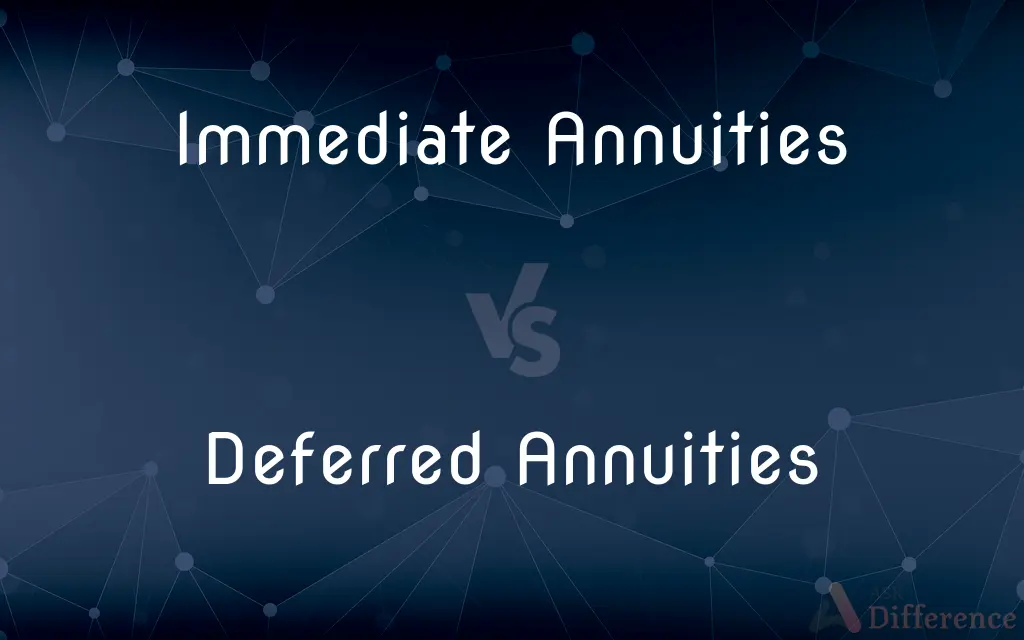Immediate Annuities vs. Deferred Annuities — What's the Difference?
By Tayyaba Rehman & Maham Liaqat — Published on March 2, 2024
Immediate Annuities start paying out soon after purchase, providing a steady income stream, typically for retirees. Deferred Annuities begin payments at a future date, allowing investments to grow tax-deferred, catering to long-term savings goals.

Difference Between Immediate Annuities and Deferred Annuities
Table of Contents
ADVERTISEMENT
Key Differences
Immediate Annuities are financial products purchased with a lump sum that begin to pay out a guaranteed income almost immediately, often within a year of purchase. They are particularly attractive to retirees looking for a reliable income stream to cover living expenses.
Deferred Annuities, on the other hand, are designed for income to start at a future date, often years after the annuity is purchased. This delay allows the investment to grow over time, offering the potential for a larger income stream in the future.
One key difference is in their appeal to investors at different life stages. Immediate Annuities are typically sought after by individuals who are already retired or nearing retirement and wish to convert a portion of their savings into a steady income. Deferred Annuities are more appealing to those earlier in their career, who are focused on growing their retirement savings over time.
The taxation of these annuities also differs. With Immediate Annuities, part of each payment is considered a return of the original investment and is not taxed, while the interest portion is taxable. For Deferred Annuities, the money grows tax-deferred until withdrawals begin, potentially at a lower tax rate in retirement.
Immediate Annuities provide security and simplicity, offering a fixed income that is easy to understand and plan for. Deferred Annuities offer flexibility and the potential for growth, with options for how and when to start income payments.
ADVERTISEMENT
Choosing between an Immediate or Deferred Annuity depends on one’s current financial situation, future income needs, and tax considerations. Immediate Annuities suit those needing immediate income, while Deferred Annuities are better for those with a longer time horizon aiming to grow their investments.
Comparison Chart
Payment Start Time
Almost immediately after purchase
At a future date, allowing investment growth
Primary Audience
Retirees or those nearing retirement
Individuals in earlier career stages
Investment Growth
Not applicable, as payments start immediately
Potential for growth due to tax-deferred accumulation
Taxation
Income partially tax-free, based on investment return
Tax-deferred growth, taxes due at withdrawal
Objective
Provide steady income for current expenses
Grow savings for future income
Flexibility
Limited to no flexibility after purchase
Various options for payouts and investments
Income Security
High, with guaranteed payments
Depends on the account's performance and chosen options
Planning Suitability
Suitable for immediate income needs
Suitable for long-term income planning
Compare with Definitions
Immediate Annuities
Immediate Annuities guarantee income shortly after investment.
He bought an immediate annuity to secure a monthly check right after retiring.
Deferred Annuities
Suitable for long-term retirement planning.
Young professionals often choose deferred annuities to enhance their retirement savings.
Immediate Annuities
No investment growth phase is involved.
Immediate annuities provide stability without the concern for market fluctuations.
Deferred Annuities
Deferred Annuities grow investments tax-deferred until payout.
His deferred annuity accumulated tax-free earnings until he decided to retire.
Immediate Annuities
They are often used to supplement retirement income.
The couple used an immediate annuity to cover their basic living expenses in retirement.
Deferred Annuities
Can include additional features like death benefits.
His deferred annuity included a death benefit for his beneficiaries.
Immediate Annuities
Payouts can be fixed or variable.
She chose a fixed immediate annuity for predictable income.
Deferred Annuities
They allow for investment in various assets.
The deferred annuity offered a choice between fixed interest and variable funds for growth potential.
Immediate Annuities
They offer a straightforward approach to retirement funding.
Immediate annuities simplified their financial planning during retirement.
Deferred Annuities
They offer flexible payout options.
Upon retirement, she opted for a lifetime payout from her deferred annuity.
Common Curiosities
Can you lose money in a Deferred Annuity?
Yes, if you choose a variable deferred annuity, your investment can fluctuate with market conditions, potentially decreasing in value.
What is a Deferred Annuity?
A Deferred Annuity is a financial contract that grows funds tax-deferred until future withdrawals, aimed at long-term savings and eventual income.
Who should invest in a Deferred Annuity?
Those with a longer time horizon before retirement, seeking to grow their savings tax-deferred, may benefit from a Deferred Annuity.
How soon do Immediate Annuities start paying?
Immediate Annuities typically start paying within one year of purchase, providing a quick income source.
What are the benefits of Deferred Annuities?
Deferred Annuities offer tax-deferred growth, flexibility in payout options, and potentially higher income in the future due to investment growth.
Who should consider an Immediate Annuity?
Individuals looking for a secure, immediate income stream in retirement may find Immediate Annuities suitable.
Is there a minimum investment for Immediate Annuities?
Yes, Immediate Annuities typically require a minimum investment, which can vary widely among insurers, often ranging from $5,000 to $10,000.
What is an Immediate Annuity?
An Immediate Annuity is an insurance product that provides guaranteed income shortly after a lump sum investment, often used by retirees.
Are Immediate Annuities taxable?
Part of each Immediate Annuity payment is considered a return of principal and is not taxable, while the interest component is taxable.
Can I withdraw money from a Deferred Annuity?
Yes, but withdrawals before a certain age may incur penalties and tax implications.
Do Deferred Annuities have fees?
Yes, Deferred Annuities often come with various fees, including administrative fees, mortality and expense risk charges, and surrender charges for early withdrawal.
Can I convert a Deferred Annuity into an Immediate Annuity?
Yes, many Deferred Annuities offer the option to annuitize the contract, converting it into an Immediate Annuity to start receiving regular income payments.
How are Immediate Annuity payments calculated?
Immediate Annuity payments are determined by several factors, including the amount invested, the age and gender of the annuitant, the current interest rate environment, and the selected payout option.
Can I change the beneficiary on my Deferred Annuity?
Yes, most Deferred Annuities allow the owner to change the beneficiary designation, subject to the terms of the contract and any applicable laws.
Share Your Discovery

Previous Comparison
Conviction vs. Condemnation
Next Comparison
Driving Lights vs. Fog LightsAuthor Spotlight
Written by
Tayyaba RehmanTayyaba Rehman is a distinguished writer, currently serving as a primary contributor to askdifference.com. As a researcher in semantics and etymology, Tayyaba's passion for the complexity of languages and their distinctions has found a perfect home on the platform. Tayyaba delves into the intricacies of language, distinguishing between commonly confused words and phrases, thereby providing clarity for readers worldwide.
Co-written by
Maham Liaqat















































